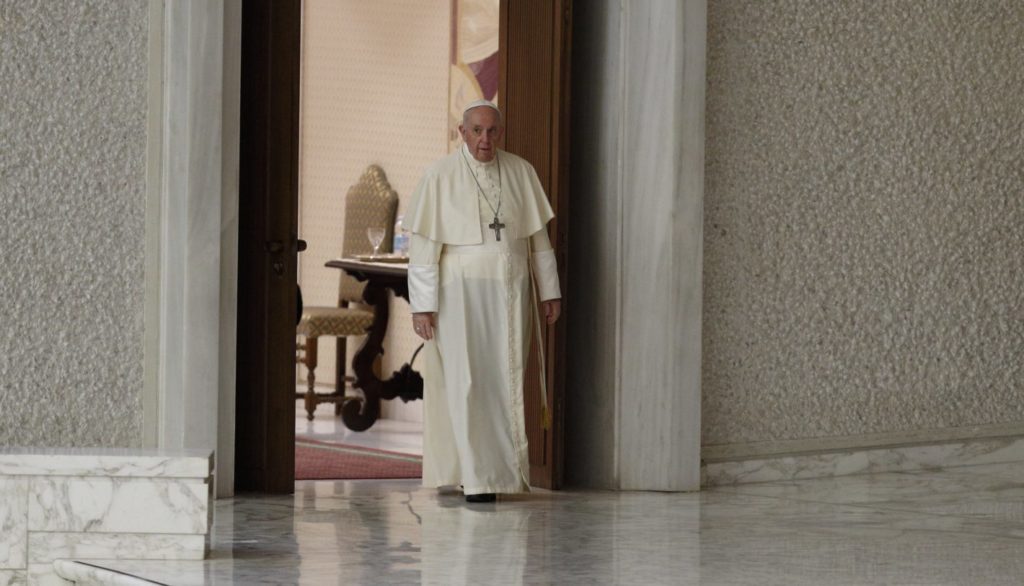Pope Francis commented on another passage from St. Paul's Letter to the Galatians during this Wednesday's audience. "In the preceding catecheses," Francis began, "we have seen how the Apostle Paul shows the first Christians of Galatia the danger of abandoning the path they have begun to walk in welcoming the Gospel. In fact, the risk is that of falling into formalism and denying the new dignity they have received. The passage we have just heard begins the second part of the Letter. Up to this point, Paul has spoken of his life and vocation: of how the grace of God has transformed his life, placing it completely at the service of evangelization. At this point, he directly challenges the Galatians: he confronts them with the choices they have made and their present condition, which could nullify the experience of grace they have lived.
"The terms with which the apostle addresses the Galatians are not polite. In the other Letters it is easy to find the expression "brethren" or "dearly beloved", but not here. He says generically "Galatians" and on two occasions he calls them "foolish". He does not do this because they are unintelligent, but because, almost without realizing it, they run the risk of losing the faith in Christ that they have embraced so enthusiastically. They are foolish because they do not realize that the danger is that of losing the precious treasure, the beauty of the newness of Christ. The wonder and sadness of the Apostle are evident. Not without bitterness, he provokes these Christians to remember the first announcement made by him, with which he offered them the possibility of acquiring a hitherto unexpected freedom".
"The apostle addresses questions to the Galatians in an attempt to shake their consciences. These are rhetorical questions, because the Galatians know very well that their coming to faith in Christ is the fruit of the grace received through the preaching of the Gospel. The word they had heard from Paul focused on the love of God, fully manifested in the death and resurrection of Jesus. Paul could not find more convincing expressions than the one he had probably repeated several times in his preaching: "It is no longer I who live, but Christ lives in me; the life which I now live in the flesh I live by faith in the Son of God who loved me and gave himself for me" (Gal 2:20). He did not want to know anything other than Christ crucified (cf. 1 Cor 2:2). The Galatians must look to this event, without being distracted by other announcements. In short, Paul's intent is to put Christians on the spot so that they realize what is at stake and do not allow themselves to be charmed by the voice of the sirens who want to lead them to a religiosity based solely on the scrupulous observance of precepts".
"The Galatians, on the other hand, understood very well what the apostle was referring to. Certainly, they had experienced the action of the Holy Spirit in the community: as in the other Churches, so also among them charity and various charisms had been manifested. When they were put on the spot, they necessarily had to respond that what they had experienced was the fruit of the newness of the Spirit. Therefore, at the beginning of their coming to faith, there was the initiative of God, not of men. The Holy Spirit had been the protagonist of their experience; to put him now in the background to give primacy to their own works would be foolish".
"In this way, St. Paul also invites us to reflect on how we live our faith. And the Pope poses some questions to all the faithful: "Does the love of the crucified and risen Christ remain at the center of our daily life as a source of salvation, or do we settle for some religious formality to have a clear conscience? Are we attached to the precious treasure, to the beauty of the newness of Christ, or do we prefer something that at the moment attracts us but later leaves us with an emptiness inside? The ephemeral often knocks at the door of our days, but it is a sad illusion, which makes us fall into superficiality and prevents us from discerning what is really worth living. Therefore, let us hold firm to the certainty that, even when we are tempted to turn away, God continues to bestow his gifts. This is what the apostle reiterates to the Galatians, recalling that it is the Father "who gives you the Spirit and works miracles among you" (3:5). He speaks to the present - "bestows", "works" - not to the past. For, notwithstanding all the difficulties we may place in the way of his actions, God does not abandon us but remains with us in his merciful love. Let us ask for the wisdom to always be aware of this reality".








